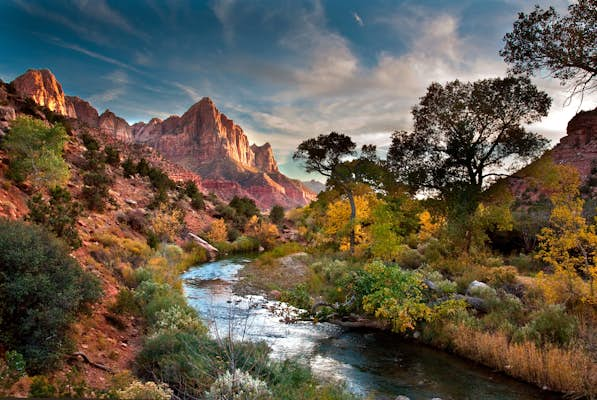Zion and Bryce Canyon are two of the USA’s most popular national parks. With only a 90-minute drive separating these iconic landscapes, the national parks are often compared by travelers making the trip to southern Utah. But if you have limited time, is it better to visit Zion or Bryce Canyon?
To help you choose, we’ll compare Zion National Park and Bryce Canyon National Park in a four-round face-off. Still can’t decide? Best to take the time and visit them both for yourself!
Getting around Zion National Park
One of the USA‘s most diverse parks, Zion National Park is a 229-sq-mile natural wonderland packed with gorgeous sandstone canyons and forested mountains in a landscape that varies from rivers to desert. Most of the sights can be reached along the 6-mile Zion Canyon Scenic Drive, which is accessible only via a park-run shuttle bus from March to November.
Getting around Bryce Canyon National Park
One of the country’s most unique geologic landscapes is a rugged 56-sq-mile otherworldly universe marked by vibrant forested canyons and the world’s highest concentration of colorful rock spires known as hoodoos. Visitors enjoy panoramic cliffside vistas from 13 scenic overlooks along the 18-mile Bryce Canyon Scenic Drive. Because of limited parking and to ease congestion, the park encourages visitors to take the optional shuttle bus service from April to mid-October, but travelers are allowed to drive through the park year round.
Our pick for Round 1
Bryce Canyon National Park for getting around, Zion National Park for landscape diversity.

Hiking and accommodations at Zion National Park
Zion is known for some of the finest trails in the national park system, and popular hikes include the strenuous 5.4-mile ascent to the towering canyon overlook at Angels Landing and the rugged 16-mile trek through The Narrows surrounded by 1000ft-high cliffs. Other recommended hikes include the easy, flat and paved 3.5-mile Pa’rus Trail and the more moderate 1-mile scramble to the panoramic viewpoint at the end of the Canyon Overlook Trail.
Zion has three campgrounds plus accommodations at the rustic Zion Lodge. In June 2021, Zion was named an International Dark Sky Park, meaning that it has high-quality night skies that are good for stargazing. More accommodations are available in Springdale, the town that sits just outside the park’s gate.
Hiking and accommodations at Bryce Canyon National Park
Bryce Canyon offers 15 hikes in its main section, many of which can be accessed via the park’s 5.5-mile Rim Trail, which extends along a number of the park’s popular viewpoints. The more strenuous 5.5-mile Peekaboo Loop is another worthwhile option, while an easier hike with sweeping vistas extending for 100 miles can be admired along the 1-mile Bristlecone Loop.
Bryce Canyon offers two campgrounds, as well as accommodations at the historic Bryce Canyon Lodge. The park has some of darkest skies in North America, which makes stargazing around the campfire in Bryce Canyon an epic experience. Hotels are available in Bryce Canyon City, outside of the park’s entrance.
Our pick for Round 2
Zion National Park for hiking, Bryce Canyon National Park for camping.

Crowds and wildlife at Zion National Park
Attracting 4.5 million visitors in 2019, Zion is the country’s fourth most-visited national park (after Great Smoky Mountains, the Grand Canyon and Rocky Mountain National Park). Crowds are common along main roads and many popular trails, especially in summer and fall. Zion’s elevation ranges from 3700 and 8700 feet, and the park’s high temperature in July averages 100°F.
Zion National Park features 291 bird species and 78 species of mammals, including mule deer, foxes and bighorn sheep.
Crowds and wildlife at Bryce Canyon National Park
With 2.6 million visitors in 2019, Bryce Canyon is America’s 12th most popular park. Crowds are common at most scenic overlooks and a number of trails, especially in summer, but the atmosphere is quieter than at Zion.
More than 170 bird species and 59 species of mammals, including mule deer and prairie dogs, call Bryce Canyon home. Bryce Canyon has an elevation between 8000 and 9000 feet, and the average high temperature in July is 80°F.
Our pick for Round 3
Bryce Canyon National Park for fewer crowds, Zion National Park for more wildlife.

Zion’s gateway towns and nearby state parks
The town of Springdale just outside Zion is a classic national park town offering the full suite of amenities for travelers, with a wide range of accommodations and lively small-town restaurants brimming with local character. The Zion area also features an abundance of lesser-known state parks located within an hour’s drive, including the criminally overlooked mini-Zion that is Snow Canyon State Park and the windswept desert landscapes of Coral Pink Sand Dunes State Park.
Bryce Canyon’s gateway towns and nearby state parks
The tiny hamlet of Bryce Canyon City is little more than a collection of a few shops and restaurants that, while pleasant, runs its course rather quickly. Still, the sheer variety of nature surrounding the more remote Bryce Canyon certainly makes up for it. Must-do nearby excursions include exploring the deep red sandstone arches of Red Canyon in Utah’s massive Dixie National Forest and navigating the highly photogenic multicolored mountains of Kodachrome Basin State Park.
Our pick for Round 4
Zion National Park for surrounding towns, Bryce Canyon National Park for surrounding parks.
Jay Gentile traveled to Zion and Bryce Canyon national parks with assistance from Visit Utah. Lonely Planet contributors do not accept freebies in exchange for positive coverage.
You might also like:
Are National Park visitors centers worth it? Regulars weigh in
Best outdoor activities in southern Utah
Introducing Utah’s national parks
